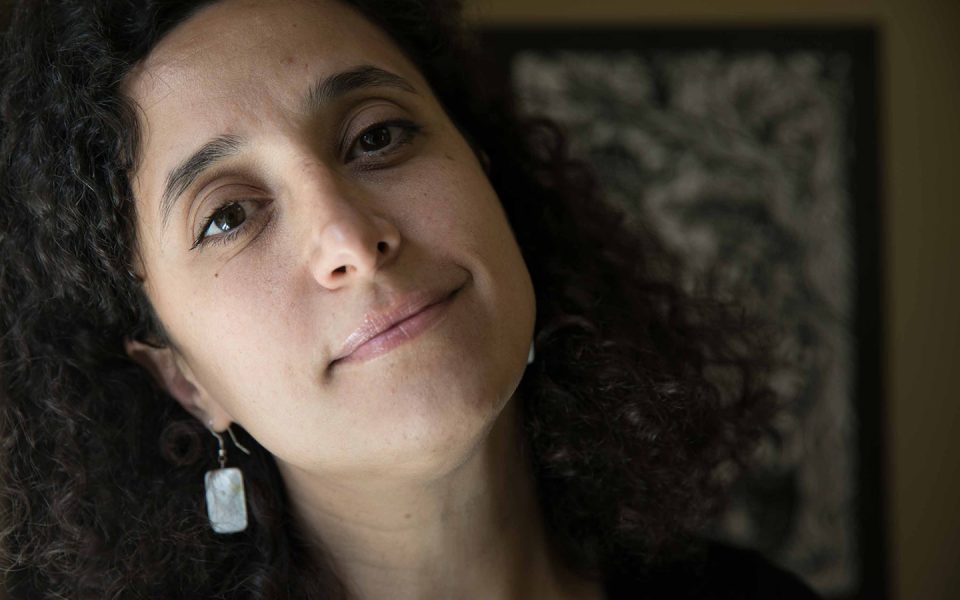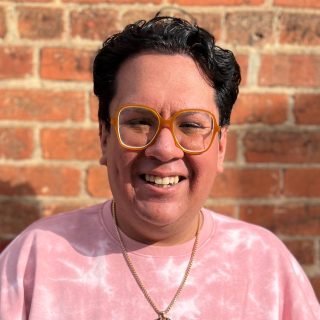Featured photo: Professor Diya Abdo, a Palestinian woman whose grandmother once sought refuge in Jordan, started the Every Campus a Refuge program in 2015. Since then, it has spread to six other universities in the US, providing free housing to refugees on campus, language tutoring, assistance with job searches, and an army of volunteers, many of whom are students in Guilford’s ECAR minor. (photo taken April 5, 2018 by Cheryl Diaz Meyer)
Dr. Diya Adbo is the Lincoln Financial Professor of English in the Department of English and Creative Writing at Guilford College. She is the author of American Refuge: True Stories of the Refugee Experience to be released this September. Dr. Adbo is also the founder of Every Campus A Refuge which works with refugee families on college and university campuses to assist in their resettlement.
On May 22, Dr. Abdo will be speaking as part of a panel for the Greensboro Bound Literary Festival, which runs from May 19-22. Ahead of her session with Greensboro Bound Festival, Dr. Abdo spoke to Triad City Beat about the shifting landscape of refugee support, the work of ECAR in the last several years, the inspiration for her book and what it means to be a part of the upcoming festival. The conversation has been edited for length and clarity.
I wanted to start by introducing you to our readers. Who are you? What is your background?
The first thing I always say about myself is that I’m Palestinian. I think most Palestinians do that. I was born and raised in Jordan. My parents and grandparents were Palestinian refugees and I studied in Jordan as an undergrad… and studied English language and literature. I was really interested in being a professor. I knew from a very young age that that’s what I wanted to do. After I finished my bachelor’s degree, I applied to United States institutions for my master’s and PhD because the plan was to get both and come back to Jordan to be a professor at a Jordanian university. I got into a really lovely, small, liberal arts institution in New Jersey called Drew University, which is where I got my master’s and PhD. Initially, I was very much an Americanist, I was interested in 20th Century American literature. While I was in New Jersey… Sept. 11 happened. It just fundamentally changed everybody’s lives and the trajectory of my own. As one of the very few Muslim and Arab women on that campus, I became the go-to for a lot of people who wanted to know more about Arab and Muslim women.
I knew about myself, and I knew a little bit about my community back in Jordan and, of course, Palestine. But it was clear that I was being asked to speak at a very different level that I was not comfortable representing. What that did, though, was it made me really curious and interested in Arab women writers and Arab and Islamic feminisms. So I changed my field of study and focused on Arab and Islamic feminism and Arab women writers. Now that’s my specialty.
How did you come to Greensboro?
I decided to go back to Jordan [after school] and teach in Jordan. While I was in Jordan, an article that I had published, a comparative piece between a Lebanese novel and an Irish play that focused on the use of women’s bodies and queer bodies in political conflict, was flagged by the university where I was teaching as anti-Islamic. They asked me to resign because of that publication and I challenged them. We spent the year back and forth and eventually they sort of took back the resignation. But I had felt just really broken by that experience so I applied for jobs. When I saw the Guilford [College] job description, I just felt that this was the perfect place for me. I’m happy that I landed here. So I came back to the US in 2008. I’ve been at Guilford ever since, with the exception of two years that I took leave to direct the Center for New North Carolinians at UNCG.
In 2018, Triad City Beat profiled Every Campus A Refuge. How has the program changed and how has the work shifted since 2018?
I think the pandemic has really, first of all, made it harder for us to engage other campuses because so many people were just treading water. The students were all at home. It was hard to grow ECAR during that time. The other thing that happened is that we have a new president. A lot of policies around refugees and immigrants are so different now.
During the Trump administration, there were executive orders about particular countries that were not allowed to come in and there was a very steep lowering of the refugee admission numbers. A lot of those things were changed and reversed with the Biden administration and the increase in the refugee admission cap. But then, of course, Afghanistan and then Ukraine.
I would say that as we were getting out of COVID during the last year and as we were receiving Afghani evacuees — over 80,000 — it became more urgent to engage campuses in the work because of not only the pandemic, but also because the policies of the previous administration had really affected the refugee resettlement landscape in this country. And so we have been really working very hard to engage campuses over the last few months.
The other thing that we’ve been really doing at ECAR is growing our materials that we can offer to implement this effort as quickly as possible. We’ve always had a best-practices manual. We also developed a handbook for program coordinators and developed implementation checklists. We’ve developed trainings to train other campuses in implementing this work. And we’ve also developed a really cool tool called the ECAR Map Tool. It is a map of this country with every college and university, every resettlement agency and as many refugee support organizations as we can put in. And it really allows every college or university to put in their name and find their partners so that they can develop these resettlement ecosystems.

Your new book American Refuge: True Stories of the Refugee Experience comes out this September. What was the process and inspiration for this book?
When I thought about the kind of books that I would want to write that spoke to the refugee experience, I thought about the kinds of books that I can’t find and would like to assign to my students. So the kind of book that told a story but in a way that was really grounded in dignity and agency, that did not fetishize their tragedy, did not make a spectacle of their tragedy, but really spoke about it in ways that were just human and straightforward.
I wanted that ethos, but also to capture the journey because before a refugee is a refugee, they’re like everybody. They’re just minding their business, living their lives. They love the homes they come from. Something happens that’s disastrous that causes them to leave in a moment, in a second, in a week. And then they find themselves at the border of a neighboring country and there’s a process that they go through. And then there’s a refugee camp, and then there’s the resettlement experience once they come to the United States. So the arc of that journey is long and it is very complex. The before, the during, the after, I wanted a text that could cover individual experiences, to show the diversity of folks who at one point were called refugees or designated as refugees, but also to show the variations in those experiences and the similarities that nobody wants to leave their home. That resettlement is hard. No matter what they tell you, landing in this country is not the end of your problems.
In watching some of your talks, I was struck by the fact that the resettlement process in the US is 90 days which is shorter than in countries like Canada and Germany.
A lot of things are not necessarily public knowledge about the refugee resettlement program [in the US]. That it is a 90-day program with the expectation of at the end of those 90 days, that a refugee receives $1,000 and some change as a one-time stipend. That’s it. And that refugees have to pay back the plane ticket that brought them here to the resettlement agencies.
Is there anything else you want to add about the inspiration for your book?
In my time at Every Campus A Refuge, I’d become close with several folks that we’ve hosted [at Guilford College]. I knew, obviously, their stories very intimately, but those were stories that were shared with me in confidence. I actually went back to some of those individuals and said, ‘Would you be interested in sharing your story for a book?’ Then we did formal interviews for the purpose of this book. That was really a lesson for me and how if you’re sharing personal experiences, you have to have that kind of permission and that kind of consent from folks. The book is the stories of several people who have participated in ECAR. The last chapter is just a lot of information about refugee resettlement, the history of refugee resettlement and all of basic information that I think would be really helpful for people to know about refugees and refugee experiences.
You’re part of a session called ‘Immigration and Refugee Matters’ for Greensboro Bound. What does it mean for you to be a part of the festival?
We are very proud of the Scuppernong Books. Most recently I’ve read there as part of an anthology I’m in called Crossing the Rift: North Carolina Poets on 9/11 and Its Aftermath. I’m just incredibly honored that I am at a level where I get to be part of the festival. For me, Greensboro is a special place, and the book is really about Greensboro. The book is about the folks who have come to Greensboro to resettle, the folks who have come to Greensboro to start at the next step in their journey as newcomers. For me, it’s like full circle to have that book be part of the festival because it is a Greensboro book.
Anything else you’d like to mention?
I think there is so much energy right now around supporting refugees, whether it’s Afghan or Ukrainian refugees. I think it would be really great if readers really thought about maybe their alma maters or maybe their son goes to a university or their daughter goes to a college that they might bring this idea to. And I’m always happy to connect with folks who want to brainstorm how they can get a local college or university engaged in refugees.
Join the First Amendment Society, a membership that goes directly to funding TCB‘s newsroom.
We believe that reporting can save the world.
The TCB First Amendment Society recognizes the vital role of a free, unfettered press with a bundling of local experiences designed to build community, and unique engagements with our newsroom that will help you understand, and shape, local journalism’s critical role in uplifting the people in our cities.
All revenue goes directly into the newsroom as reporters’ salaries and freelance commissions.


Leave a Reply